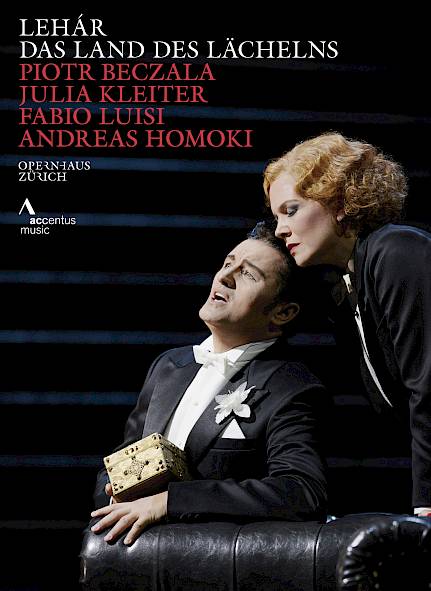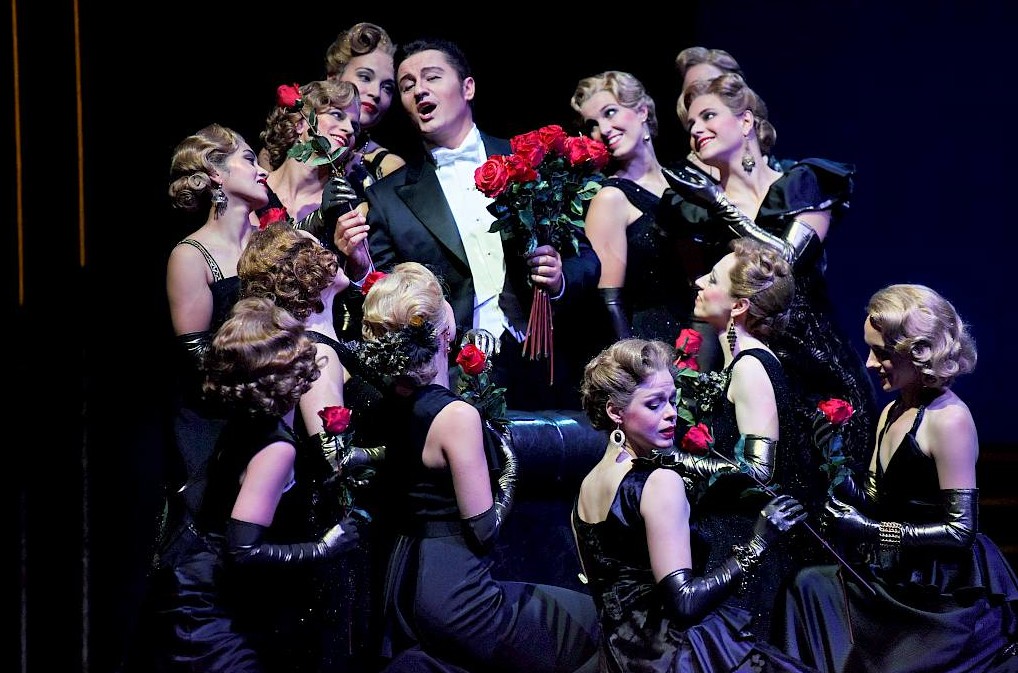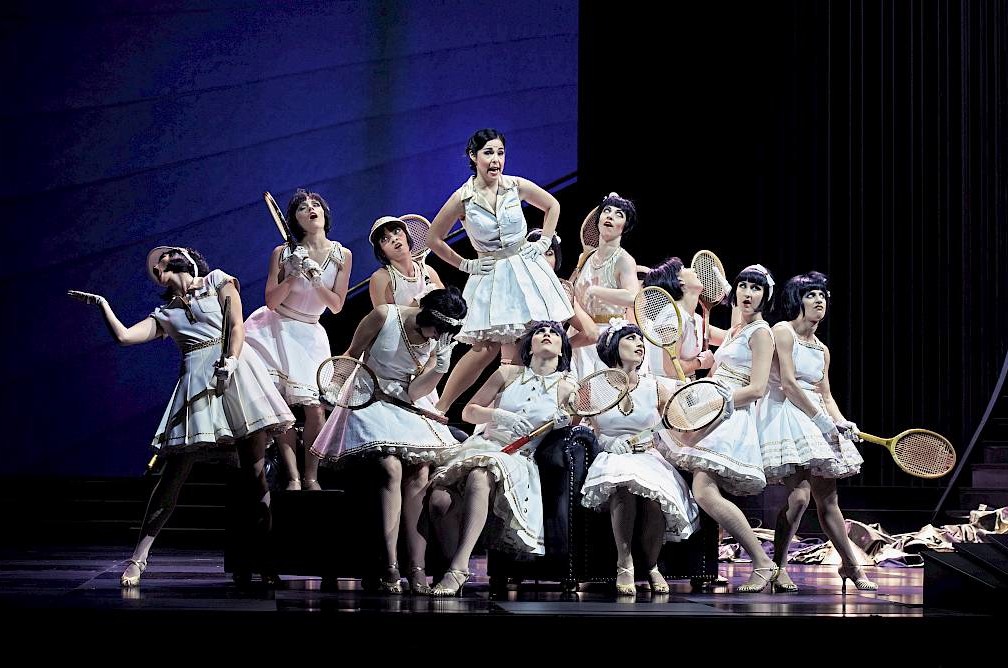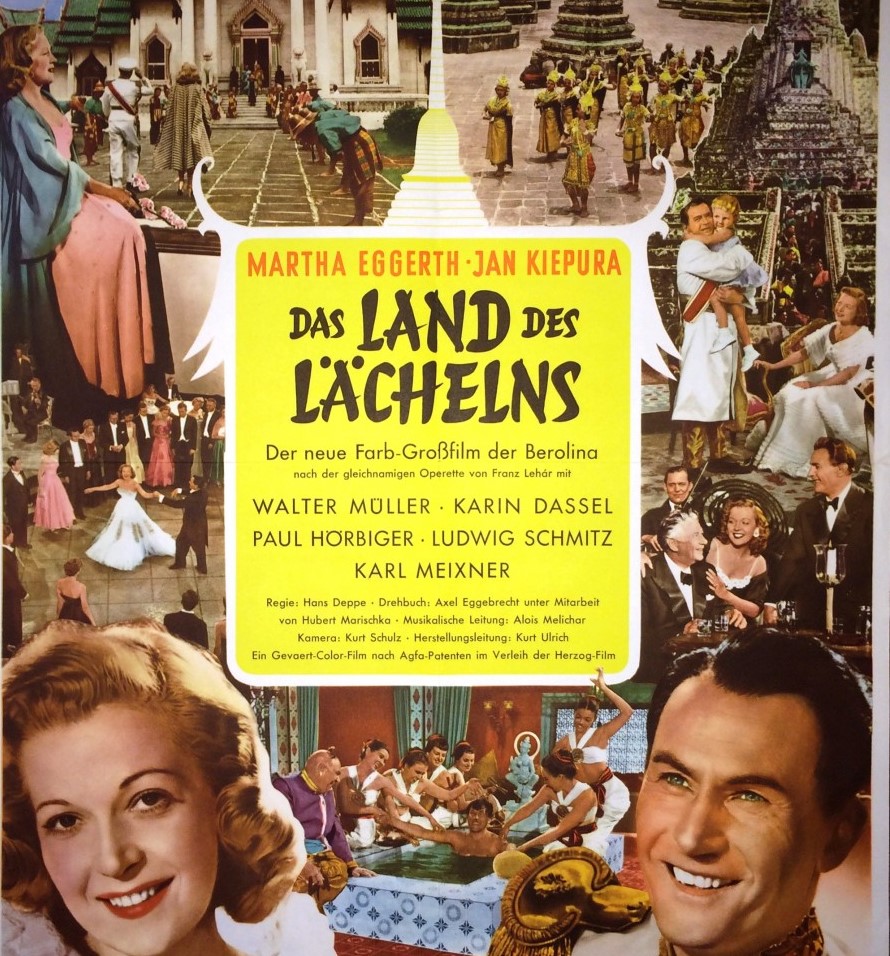Kevin Clarke
Operetta Research Center
6 August, 2018
Everyone knows that Lehár had a not-so-secret longing for the ‘grand operatic’ and devoted the latter part of his long career to creating ‘opera-operettas’ – so called “Tragische Operetten” – composed for his muse, tenor Richard Tauber. The last one of them, Giuditta, actually premiered at the Vienna State Oper in 1934, which was a big deal at the time, and it apparently gave Lehár the feeling to have arrived as a ‘serious’ composer. (Obviously, his Viennese colleagues were very jealous, chief among them Emmerich Kálmán.) However, the other Tauber opera-operettas were created for typical operetta venues with typical operetta ensembles which were enriched by Tauber and a female star. In the case of Land des Lächelns, which premiered at the Metropol Theater in 1929, this female star was Verdi soprano Vera Schwarz. Together, the two were the vocal attraction in an otherwise opulent Far East revue full of dancing girls and exotic sets. And there was a gripping culture clash story of West meets East. Now, Land des Lächelns is out on yet another new DVD, this one a live performance from Opera Zurich, directed by Andreas Homoki and starring Piotr Beczala as Prince Sou Chong – yes, that’s the one who gets to sing “Dein ist mein ganzes Herz.”

The DVD release of “Land des Lächelns” featuring Piotr Beczala and Julia Kleiter. (Photo: accentus music)
One thing that is immediately obvious is that Mr Homoki is not interested in plot. And I mean: not interested at all. He has eliminated most of the dialogue, leaving only cues that lead directly to the next musical number. Technically, you might be watching a concert performance. I found it staggering that someone should show such disregard to the libretto. As a matter of fact, the librettists are not even mentioned on the DVD front or back cover. It just says ‘Lehár.’ The result of this total neglect of storytelling and libretto is that the stage action seems ludicrous.

Piotr Beczala as Sou Chong and the Zurich chorus girls in “Land des Lächelns.” (Photo: Toni Suter / Oper Zürich)
There are two stair cases – as so often in Homoki productions – which the singers, chorus, dancers and extras climb up and down on. However, such an art deco staircase (designed by Wolfgang Gussmann) is never utilized in the way grand Hollywood musicals use them as stairways to paradise. This staircase is just evidence of a lamentable lack of imagination. Or is all of this supposed to be post-modern deconstruction and up-to-date to the extreme? (Costumes by Wolfgang Gussmann and Susana Mendoza; light design by Franck Evin.)
When you read interviews with Andreas Homoki about operetta, you think you’re hearing an expert speak of the genre, someone who has spent years philosophizing about the art form. It’s a great gift Mr. Homoki has: masking his operetta analphabetism with suave words. Somewhat amazingly, critics of his Land des Lächelns did not seem to have minded the incompetence to bring this still very contemporary story to the stage in a convincing way. Maybe because they were overwhelmed by the glorious singing?

The double staircase in Andreas Homoki’s “Land des Lächelns” at Zurich Opera, with Piotr Beczala in a yellow costume. (Photo: Toni Suter / Oper Zürich)
The glory, principally, only goes to Piotr Beczala who sounds outstanding throughout. He released a Tauber album on Deutsche Grammophon a few years ago, and obviously the Lehár music written for Tauber suits any tenor well.
Mr Beczala doesn’t have the dark sensuality Tauber once infused this music with, he also shies away from the famous ‘throbbing kitsch elements’ that Tauber utilized. Beczala’s singing is far ‘cleaner’ stylistically, in the 1960s Fritz Wunderlich tradition of operetta performance: clear lines, shimmering silver timbre, explosive but tastefully held top notes. This works wonderfully well for the big solos “Aus Apfelblüten einen Kranz”, “Immer nur lächeln”, and obviously “Dein ist mein ganzes Herz”.
Soprano Julia Kleiter has a nicely rounded soprano voice, but she is no ‘star attraction’. If you recall how Elisabeth Schwarzkopf colored the duets Lisa-Sou Chong vocally you’ll be disappointed to hear the lack of meaningful handling of the text. Should we blame Julia Kleiter? After all, there is no ‘meaning’ in this abstract action on stage. So how should a singer infuse any into the lyrics and remains of the libretto?
Given the stiffness of a typical opera house ensemble, it’s no surprise that Rebeca Olvera as Mi and Spencer Lang as Count Gustav von Pottenstein are hardly what you’d expect of a musical comedy dream team. There are recordings of Mi’s music from London from the early 1930s: they have that dance band cheekiness that sets the comedy numbers apart from the grand opera sections; here it all sounds the same under the baton of Fabio Luisi. He doesn’t seem to have bothered with the finer details of operetta and/or Lehár. And playing the dance and comedy numbers the same way as the romantic love music takes out all contrast in the score. Which in turn makes the music less theatrical than it should be, and boring.
Still, this production was broadcast by ZDF/arte on TV, and it is now released on DVD – going out into the world as an example of modern day operetta practice. Yes, I could bang my head against to wall and scream because of this. But what good would that do? (It would give me a headache, for sure.) There is no point ignoring productions such as Andreas Homoki’s operetta outings. (He’s doing Sweeney Todd next season in Zurich, and in Berlin there’s My Fair Lady to digest, he also presented Csardasfürstin and Lustige Witwe in Berlin years ago; the latter two also set on stair cases, both with reduced libretti.)

Rebeca Olvera as Mi (with chorus) in “Land des Lächelns” in Zurich. (Photo: Toni Suter / Oper Zürich)
I believe it’s important to point out to potential buyers of this DVD that what you see has little to do with operetta, or, as a matter of fact, with Land des Lächelns.
If you just wish to enjoy the music, and your focus is the tenor music, then seeing and hearing Piotr Beczala live on stage in Zurich is a joy. If you want an all round great cast, there are countless good recordings; the best, for me, is Tauber’s own version from 1929.
As for films, there is the early sound film with Tauber. It’s not really watchable, but definitely interesting as a historic document. Then there is the 1950s film with Marta Eggerth and husband Jan Kiepura, dated as that might be: there’s more thrill and splash in Kiepura and Eggerth than Beczala/Kleiter. (Not just because of the bath tub scene.)

The 1952 film version of “Land des Lächelns” with Marta Eggerth and Jan Kiepura.
There’s also the 1970s production with Rene Kollo and Dagmar Koller as Sou Chong’s sister Mi, directed by Arthur Maria Rabenalt. In a way this seems even more dusty than the old Tauber film, but it’s an important and widely know historic document; and it does tell the story in its cheesy Seventies way!

DVD of “Land des Lächelns” starring Rene Kollo and Dagmar Koller. (Photo: Deutsche Grammophon)
Is it a document of our times that stories in operettas don’t matter anymore to modern day stage directors? If that is so, it’s especially frightful, because that’s exactly what the Nazis wanted: never mind the silly stories, just focus on the music, especially Lehár music. The Nazis also performed Land des Lächelns without naming the Jewish librettists Ludwig Herzer and Fritz Löhner-Beda, the latter killed in Auschwitz, hoping till the end that Hitler’s favourite composer would get him out of there. Herzer died in St Gallen, Switzerland in 1939, having espcaped from the Nazi invasion of Austria in 1938.
That Andreas Homoki in 2017 embraces such an ideal and continues such a tradition – that should have been thrown into the garbage in 1945 – at the Zurich Opera is shocking, to me at least. And I hope this kind of mindless operetta production is not the future, at least not outside of Zurich where Mr Homoki is intendant. Luckily, directors elsewhere have shown recently that the stories of operettas can be hugely enjoyable and meaningful when performed with gusto, think of Alles Schwindel (at Gorki Theater) or Perlen der Cleopatra (at Komische Oper). Admittedly, the singing in these productions was nowhere near as polished as what you hear here; but then again: not every operetta is a late Lehár operetta and as a result doesn’t actually need that kind of singing. And if you play late Lehár such as Land des Lächelns, then get your casting right and don’t treat the entire score as if every single number was written for the star opera tenor in a pseudo-Puccini manner. (Puccini himself, a friend of Lehár, didn’t just write “Che gelida manina” and repeated it for the entire duration of La Boheme; even in Puccini there are many levels of music.)
If you wish to learn more about this, I recommend reading the essay by Stefan Frey, “Eine Sünde wert: Operette als künstlerischer Seitensprung. Käthe Dorsch, Richard Tauber und andere Genre-Grenzgänger.” It can be found in the essay collection Kunst der Oberfläche: Operette zwischen Bravour und Banalität, edited by Bettina Bradl-Risi and Clemens Risi in 2015.
For more information on the Zurich production and cast, click here.

The problem is that even weak operetta DVDs should be bought by those interested in the genre. I suspect sales numbers of these items are fairly low so the only way to get publishers to do more is to buy what they do produce; otherwise there will be nothing. Not all of us can attend European performances and I have not been impressed with streaming with its frequent breaks for buffering.
After all it’s a good producton, but not at all excellent, just for the reasons Mr. Clarke says. . One may not get furious about the usual ‘adaptation’ from a ‘strange’ stage director, but one wonders why, and why Fabio Luisi agrees to combine his musical direction with the often silly useless changes from the stage directors (the comic duets are especially unfortunate). The music is so beautiful that Luisi seems to know it is but treats it without coherence. Those curtains that open and close and close and open are really wonderful ideas? Ouff, let’s respect the original work giving it force with a genuine cast, a symphonic orchestra that play Lehar as it may play …. you put a name! Operettas are often better works than operas. DAS LAND DES LAECHELNS is one … but operettas are also amusing works as the wonderful italian one L’ACQUA CHETA by Pietri, or LE SIRE DE GERVY by a great French composer Claude Terrasse, and why not almost all the Victor Herbert works … these works (and hundred of other titles) must be realoly ‘sung’, naturally forgetting Wagner & Co. … I do not know if I will watch this LAND DES LAECHELNS again, but to tell the truth I have not been so much discontented with it … should I have been? Do you say yes?